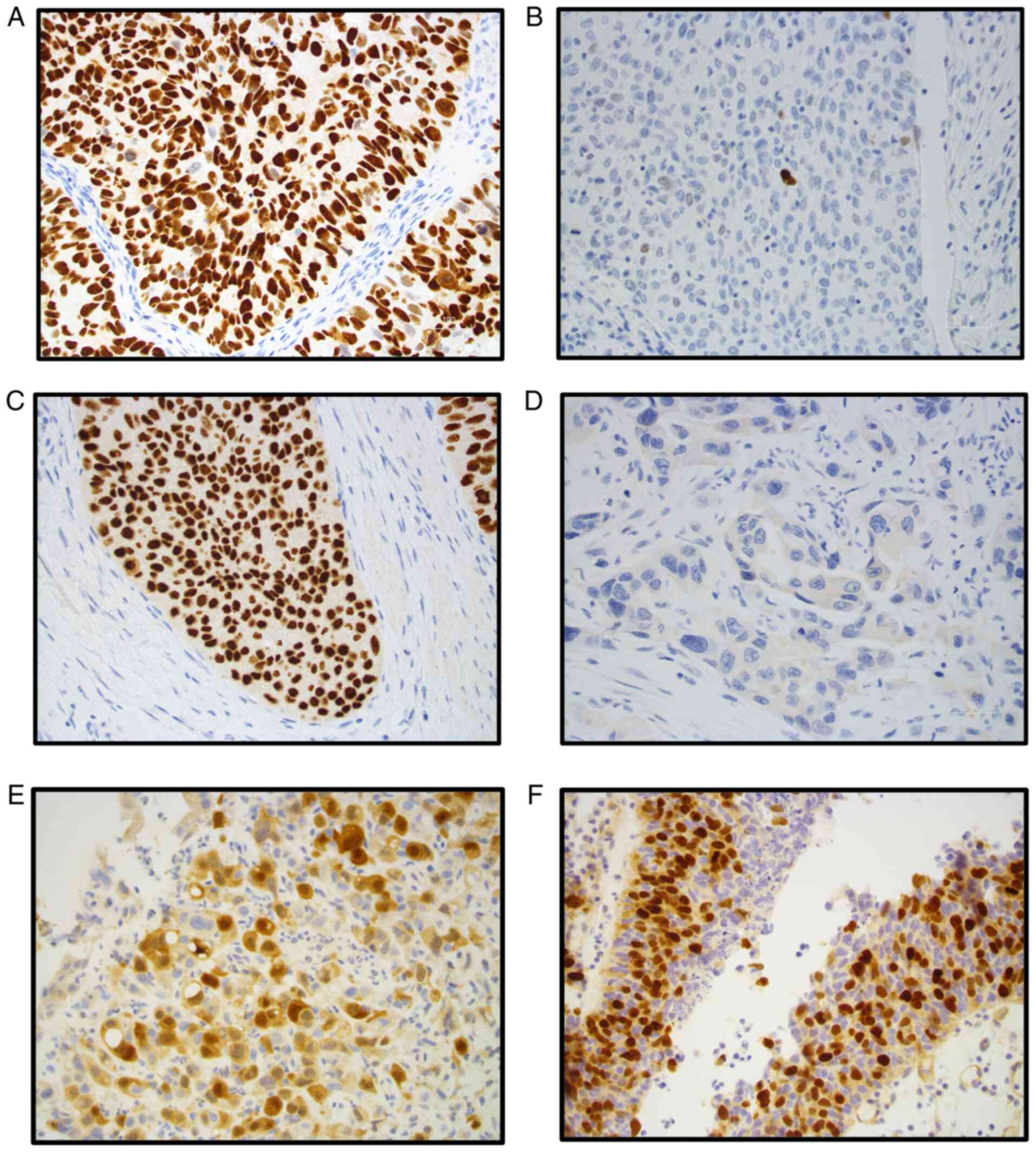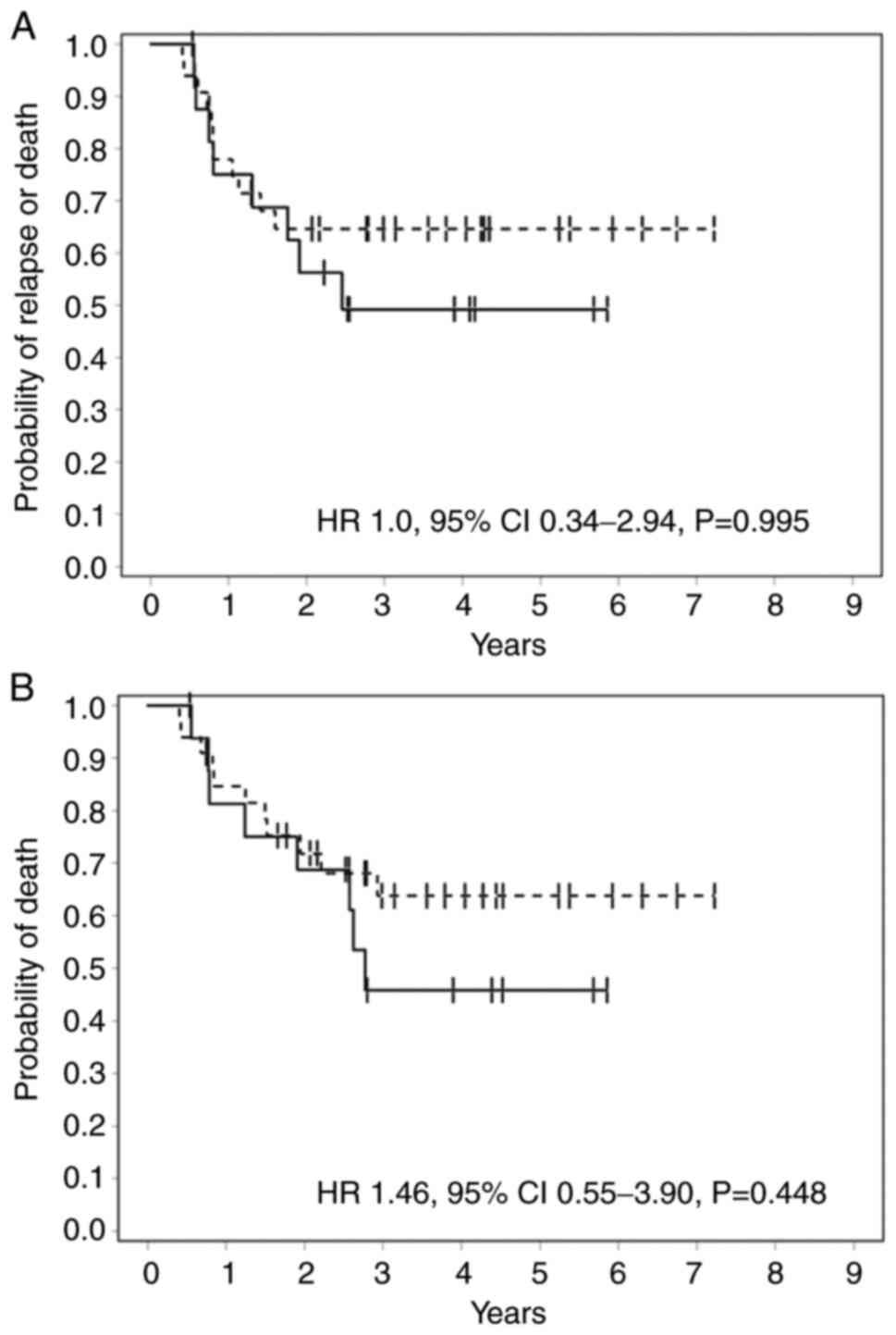|
1
|
Gully CP, Velazquez-Torres G, Shin JH,
Fuentes-Mattei E, Wang E, Carlock C, Chen J, Rothenberg D, Adams
HP, Choi HH, et al: Aurora B kinase phosphorylates and instigates
degradation of p53. Proc Natl Acad Sci USA. 109:E1513–E1522.
2012.PubMed/NCBI View Article : Google Scholar
|
|
2
|
Nikonova AS, Astsaturov I, Serebriiskii
IG, Dunbrack RL Jr and Golemis EA: Aurora A kinase (AURKA) in
normal and pathological cell division. Cell Mol Life Sci.
70:661–687. 2013.PubMed/NCBI View Article : Google Scholar
|
|
3
|
González-Loyola A, Fernández-Miranda G,
Trakala M, Partida D, Samejima K, Ogawa H, Cañamero M, de Martino
A, Martínez-Ramírez Á, de Cárcer G, et al: Aurora B overexpression
causes aneuploidy and p21Cip1 repression during tumor development.
Mol Cell Biol. 35:3566–3578. 2015.PubMed/NCBI View Article : Google Scholar
|
|
4
|
Lin ZZ, Jeng YM, Hu FC, Pan HW, Tsao HW,
Lai PL, Lee PH, Cheng AL and Hsu HC: Significance of aurora B
overexpression in hepatocellular carcinoma. Aurora B overexpression
in HCC. BMC Cancer. 10(461)2010.PubMed/NCBI View Article : Google Scholar
|
|
5
|
Compérat E, Bièche I, Dargère D,
Laurendeau I, Vieillefond A, Benoit G, Vidaud M, Camparo P, Capron
F, Verret C, et al: Gene expression study of Aurora-A reveals
implication during bladder carcinogenesis and increasing values in
invasive urothelial cancer. Urology. 72:873–877. 2008.PubMed/NCBI View Article : Google Scholar
|
|
6
|
Lei Y, Yan S, Ming-De L, Na L and Rui-Fa
H: Prognostic significance of Aurora-A expression in human bladder
cancer. Acta Histochem. 113:514–518. 2011.PubMed/NCBI View Article : Google Scholar
|
|
7
|
Zhang J, Li B, Yang Q, Zhang P and Wang H:
Prognostic value of Aurora kinase A (AURKA) expression among solid
tumor patients: A systematic review and meta-analysis. Jpn J Clin
Oncol. 45:629–636. 2015.PubMed/NCBI View Article : Google Scholar
|
|
8
|
Huang D, Huang Y, Huang Z, Weng J, Zhang S
and Gu W: Relation of AURKB over-expression to low survival rate in
BCRA and reversine-modulated aurora B kinase in breast cancer cell
lines. Cancer Cell Int. 19(166)2019.PubMed/NCBI View Article : Google Scholar
|
|
9
|
Sen S, Zhou H, Zhang RD, Yoon DS,
Vakar-Lopez F, Ito S, Jiang F, Johnston D, Grossman HB, Ruifrok AC,
et al: Amplification/overexpression of a mitotic kinase gene in
human bladder cancer. J Natl Cancer Inst. 94:1320–1329.
2002.PubMed/NCBI View Article : Google Scholar
|
|
10
|
Mobley A, Zhang S, Bondaruk J, Wang Y,
Majewski T, Caraway NP, Huang L, Shoshan E, Velazquez-Torres G,
Nitti G, et al: Aurora kinase A is a biomarker for bladder cancer
detection and contributes to its aggressive behavior. Sci Rep.
7(40714)2017.PubMed/NCBI View Article : Google Scholar
|
|
11
|
Yu J, Zhou J, Xu F, Bai W and Zhang W:
High expression of aurora-B is correlated with poor prognosis and
drug resistance in non-small cell lung cancer. Int J Biol Markers.
33:215–221. 2018.PubMed/NCBI View Article : Google Scholar
|
|
12
|
Liu Q, Kaneko S, Yang L, Feldman RI,
Nicosia SV, Chen J and Cheng JQ: Aurora-A abrogation of p53 DNA
binding and transactivation activity by phosphorylation of serine
215. J Biol Chem. 279:52175–52182. 2004.PubMed/NCBI View Article : Google Scholar
|
|
13
|
Burgess EF, Livasy C, Trufan S, Hartman A,
Guerreri R, Naso C, Clark PE, Grigg C, Symanowski J and Raghavan D:
High aurora kinase expression identifies patients with
muscle-invasive bladder cancer who have poor survival after
neoadjuvant chemotherapy. Urol Oncol. 37:900–906. 2019.PubMed/NCBI View Article : Google Scholar
|
|
14
|
Sasai K, Treekitkarnmongkol W, Kai K,
Katayama H and Sen S: Functional significance of aurora kinases-p53
protein family interactions in cancer. Front Oncol.
6(247)2016.PubMed/NCBI View Article : Google Scholar
|
|
15
|
Robertson AG, Kim J, Al-Ahmadie H,
Bellmunt J, Guo G, Cherniack AD, Hinoue T, Laird PW, Hoadley KA,
Akbani R, et al: Comprehensive molecular characterization of
muscle-invasive bladder cancer. Cell. 171:540–556.e25.
2017.PubMed/NCBI View Article : Google Scholar
|
|
16
|
Esrig D, Spruck CH III, Nichols PW,
Chaiwun B, Steven K, Groshen S, Chen SC, Skinner DG, Jones PA and
Cote RJ: p53 nuclear protein accumulation correlates with mutations
in the p53 gene, tumor grade, and stage in bladder cancer. Am J
Pathol. 143:1389–1397. 1993.PubMed/NCBI
|
|
17
|
George B, Datar RH, Wu L, Cai J, Patten N,
Beil SJ, Groshen S, Stein J, Skinner D, Jones PA and Cote RJ: p53
gene and protein status: The role of p53 alterations in predicting
outcome in patients with bladder cancer. J Clin Oncol.
25:5352–5358. 2007.PubMed/NCBI View Article : Google Scholar
|
|
18
|
Esrig D, Elmajian D, Groshen S, Freeman
JA, Stein JP, Chen SC, Nichols PW, Skinner DG, Jones PA and Cote
RJ: Accumulation of nuclear p53 and tumor progression in bladder
cancer. N Engl J Med. 331:1259–1264. 1994.PubMed/NCBI View Article : Google Scholar
|
|
19
|
Garcia del Muro X, Condom E, Vigués F,
Castellsagué X, Figueras A, Muñoz J, Solá J, Soler T, Capellà G and
Germà JR: p53 and p21 expression levels predict organ preservation
and survival in invasive bladder carcinoma treated with a
combined-modality approach. Cancer. 100:1859–1867. 2004.PubMed/NCBI View Article : Google Scholar
|
|
20
|
Shariat SF, Tokunaga H, Zhou J, Kim J,
Ayala GE, Benedict WF and Lerner SP: p53, p21, pRB, and p16
expression predict clinical outcome in cystectomy with bladder
cancer. J Clin Oncol. 22:1014–1024. 2004.PubMed/NCBI View Article : Google Scholar
|
|
21
|
Stadler WM, Lerner SP, Groshen S, Stein
JP, Shi SR, Raghavan D, Esrig D, Steinberg G, Wood D, Klotz L, et
al: Phase III study of molecularly targeted adjuvant therapy in
locally advanced urothelial cancer of the bladder based on p53
status. J Clin Oncol. 29:3443–3449. 2011.PubMed/NCBI View Article : Google Scholar
|
|
22
|
Katayama H, Sasai K, Kawai H, Yuan ZM,
Bondaruk J, Suzuki F, Fujii S, Arlinghaus RB, Czerniak BA and Sen
S: Phosphorylation by aurora kinase A induces Mdm2-mediated
destabilization and inhibition of p53. Nat Genet. 36:55–62.
2004.PubMed/NCBI View
Article : Google Scholar
|
|
23
|
Yang TY, Teng CJ, Lin TC, Chen KC, Hsu SL
and Wu CC: Transcriptional repression of aurora-A gene by wild-type
p53 through directly binding to its promoter with histone
deacetylase 1 and mSin3a. Int J Cancer. 142:92–108. 2018.PubMed/NCBI View Article : Google Scholar
|
|
24
|
Shao S, Wang Y, Jin S, Song Y, Wang X, Fan
W, Zhao Z, Fu M, Tong T, Dong L, et al: Gadd45a interacts with
aurora-A and inhibits its kinase activity. J Biol Chem.
281:28943–28950. 2006.PubMed/NCBI View Article : Google Scholar
|
|
25
|
Li Z, Sun Y, Chen X, Squires J,
Nowroozizadeh B, Liang C and Huang J: p53 mutation directs AURKA
overexpression via miR-25 and FBXW7 in prostatic small cell
neuroendocrine carcinoma. Mol Cancer Res. 13:584–591.
2015.PubMed/NCBI View Article : Google Scholar
|
|
26
|
Teng CL, Hsieh YC, Phan L, Shin J, Gully
C, Velazquez-Torres G, Skerl S, Yeung SC, Hsu SL and Lee MH: FBXW7
is involved in aurora B degradation. Cell Cycle. 11:4059–4068.
2012.PubMed/NCBI View
Article : Google Scholar
|
|
27
|
Yang A and McKeon F: P63 and P73: P53
mimics, menaces and more. Nat Rev Mol Cell Biol. 1:199–207.
2000.PubMed/NCBI View
Article : Google Scholar
|
|
28
|
Katayama H, Wang J, Treekitkarnmongkol W,
Kawai H, Sasai K, Zhang H, Wang H, Adams HP, Jiang S, Chakraborty
SN, et al: Aurora kinase-A inactivates DNA damage-induced apoptosis
and spindle assembly checkpoint response functions of p73. Cancer
Cell. 21:196–211. 2012.PubMed/NCBI View Article : Google Scholar
|
|
29
|
Gailey MP and Bellizzi AM:
Immunohistochemistry for the novel markers glypican 3, PAX8, and
p40 (ΔNp63) in squamous cell and urothelial carcinoma. Am J Clin
Pathol. 140:872–880. 2013.PubMed/NCBI View Article : Google Scholar
|
|
30
|
Karni-Schmidt O, Castillo-Martin M, Shen
TH, Gladoun N, Domingo-Domenech J, Sanchez-Carbayo M, Li Y, Lowe S,
Prives C and Cordon-Cardo C: Distinct expression profiles of p63
variants during urothelial development and bladder cancer
progression. Am J Pathol. 178:1350–1360. 2011.PubMed/NCBI View Article : Google Scholar
|
|
31
|
Park BJ, Lee SJ, Kim JI, Lee SJ, Lee CH,
Chang SG, Park JH and Chi SG: Frequent alteration of p63 expression
in human primary bladder carcinomas. Cancer Res. 60:3370–3374.
2000.PubMed/NCBI
|
|
32
|
Cao X, Hou J, An Q, Assaraf YG and Wang X:
Towards the overcoming of anticancer drug resistance mediated by
p53 mutations. Drug Resist Updat. 49(100671)2020.PubMed/NCBI View Article : Google Scholar
|
|
33
|
He S, Feng M, Liu M, Yang S, Yan S, Zhang
W, Wang Z, Hu C, Xu Q, Chen L, et al: P21-activated kinase 7
mediates cisplatin-resistance of esophageal squamous carcinoma
cells with aurora-A overexpression. PLoS One.
9(e113989)2014.PubMed/NCBI View Article : Google Scholar
|
|
34
|
Bunch B, Krishnan N, Greenspan RD,
Ramakrishnan S, Attwood K, Yan L, Qi Q, Wang D, Morrison C, Omilian
A, et al: TAp73 expression and P1 promoter methylation, a potential
marker for chemoresponsiveness to cisplatin therapy and survival in
muscle-invasive bladder cancer (MIBC). Cell Cycle. 18:2055–2066.
2019.PubMed/NCBI View Article : Google Scholar
|
|
35
|
Puig P, Capodieci P, Drobnjak M, Verbel D,
Prives C, Cordon-Cardo C and Di Como CJ: p73 expression in human
normal and tumor tissues: loss of p73alpha expression is associated
with tumor progression in bladder cancer. Clin Cancer Res.
9:5642–5651. 2003.PubMed/NCBI
|
|
36
|
Seiler R, Ashab HAD, Erho N, van Rhijn
BWG, Winters B, Douglas J, Van Kessel KE, Fransen van de Putte EE,
Sommerlad M, Wang NQ, et al: Impact of molecular subtypes in
muscle-invasive bladder cancer on predicting response and survival
after neoadjuvant chemotherapy. Eur Urol. 72:544–554.
2017.PubMed/NCBI View Article : Google Scholar
|
|
37
|
Necchi A, Lo Vullo S, Mariani L, Raggi D,
Giannatempo P, Calareso G, Togliardi E, Crippa F, Di Genova N,
Perrone F, et al: An open-label, single-arm, phase 2 study of the
aurora kinase A inhibitor alisertib in patients with advanced
urothelial cancer. Invest New Drugs. 34:236–242. 2016.PubMed/NCBI View Article : Google Scholar
|
|
38
|
Dar AA, Belkhiri A, Ecsedy J, Zaika A and
El-Rifai W: Aurora kinase A inhibition leads to p73-dependent
apoptosis in p53-deficient cancer cells. Cancer Res. 68:8998–9004.
2008.PubMed/NCBI View Article : Google Scholar
|
|
39
|
Tentler JJ, Ionkina AA, Tan AC, Newton TP,
Pitts TM, Glogowska MJ, Kabos P, Sartorius CA, Sullivan KD,
Espinosa JM, et al: p53 family members regulate phenotypic response
to aurora kinase A inhibition in triple-negative breast cancer. Mol
Cancer Ther. 14:1117–1129. 2015.PubMed/NCBI View Article : Google Scholar
|
|
40
|
Grossman HB, Natale RB, Tangen CM,
Speights VO, Vogelzang NJ, Trump DL, deVere White RW, Sarosdy MF,
Wood DP Jr, Raghavan D and Crawford ED: Neoadjuvant chemotherapy
plus cystectomy compared with cystectomy alone for locally advanced
bladder cancer. N Engl J Med. 349:859–866. 2003.PubMed/NCBI View Article : Google Scholar
|
















